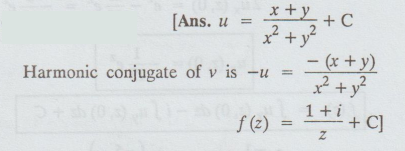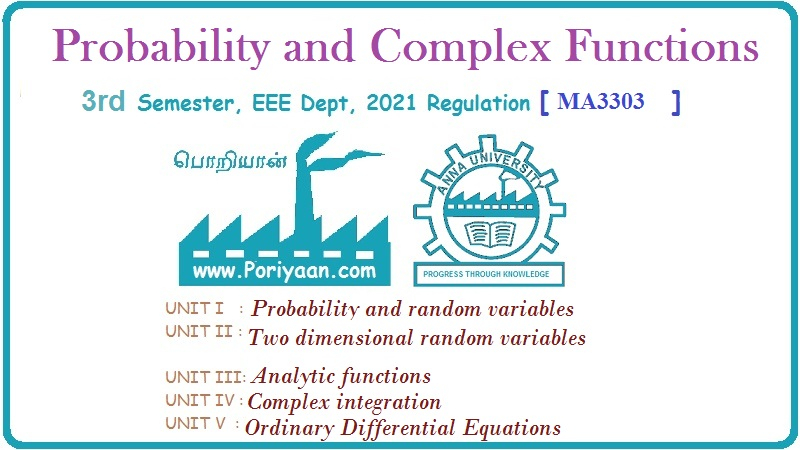Probability and complex function: Unit III: Analytic functions
Exercise 3.3 (Construction of Analytic functions)
Problems with Answer
Probability and complex function: Unit III: Analytic functions : Exercise 3.3
EXERCISE
Construction of an analytic function
1. Show that the function u (x, y) = 3x2y + 2x3 – y3 – 2y2 is harmonic function. Find the conjugate and analytic function of v and express u + iv is an analytic functin of z.
[Ans. v (x, y) = 3x2y + 4xy - x3 + C, f(z)=
-iz3 +2z2 + iC where C is a real constant ]
2. Prove that the function v = sin x coshy + 2 cos x sinh y + x2 - y2 + 4xy satisfies Laplace's equation. Determine the corresponding analytic function.
[Ans. f (z) = (2 + i) (z2
+ sin z) + C]
3. If f (z) = u + iv is an analytic function of z, and if u = 2 sin 2x / e2y + e-2y - 2 cos 2x find c.
[Ans.
v = -2 sinh 2y / e2y + e-2y - 2 cos 2x + C]
4.
Find v such that wu+iv is an analytic function of z, given that u =  cos
2 xy. Hence find w.
cos
2 xy. Hence find w.

5. Find the analytic function w = u + iv if v = e2x (x cos 2y - y sin 2y). Hence find u. [A.U A/M 2015 R13]
[Ans.
w = ize2z + C , u = - (x sin 2y + y cos 2y) e2x + C]
6. Find a harmonic conjugate of u = x4 - 6x2 y2 + y4
[Ans. v = 4yx3
- 4xy3 + C]
7. find u = x – y /x2 + y2 such that u + iv is an analytic function. What is the harmonic conjugate of v?

8.
Find the analytic function whose real part is sin 2x /cosh 2y + cos 2x
[Ans. f (z) = tan z + C] [A.U N/D 2019 (R17)]
9.
Find the analytic function whose imaginary part is -e-2xy cos (x2
- y2)

10. Prove that u = 2x - x3 + 3xy2 is harmonic and find its harmonic conjugate. Also find the corresponding analytic function.
[Ans. v = 2y - 3x2y + y3
+ C, f(z) = 2z -z3 + ic]
11. Show that u (x, y) = sin x cosh y + 2 cos x sinh y + x2 - y2 + 4xy is harmonic. Find an analytic function f (z) interms of z with the given u for its real part.
[Ans. f (z) = sinz + z2
- 2i sinz - 2iz2 + C]
12. Given v (x, y) =x4 - 6x2 y2 + y4, find f (z) = u(x, y) + iv (x, y). Show that f(z) is analytic.
[Ans. f (z) = iz4 + C]
13. If u + v = (x − y) (x2 + 4xy + y2) and f (z) = u + iv find the analytic function f (z) interms of z.
[Ans. z3 + C]
14. Find the real part of the analytic function whose imaginary part is e-x [xy cos y + (y2 - x2) sin y]. Construct the analytic function.
[Ans. u = e-x[(x2
- y2) cos y + 2xy sin y f(z)=
z2e-z + C ]
15.
If u (x, y) is a harmonic function in a region D, prove that f(z) = ∂u/∂x - ∂u/∂y
is analytic in D.
16.
Show that the following functions are harmonic and find a corresponding
analytic function f (z) = u + iv. Also find its harmonic conjugate.
(i)
u = ex cos y. [Ans. f(z)
= ez + C, v = ex sin y]
(ii)
u = x / x2 + y2 [Ans. f (z) == 1/z + C, v = -y/x2
+ y2 + C]
(iii) v = -sin x sinh y [Ans. f (z) = cos z + C, u = cos x cosh y + C]
17. represents the complex potential for an electric field and ψ = 3x2y - y3, find the potential function
represents the complex potential for an electric field and ψ = 3x2y - y3, find the potential function ![]() .
.
[Ans. ![]() =x3 - 3x2 + c]
=x3 - 3x2 + c]
18.
An incompressible fluid flowing over the xy plane has the velocity potential
![]() = x2 - y2 + x /x2 + y2
= x2 - y2 + x /x2 + y2
Examine if this is possible and find a stream function ψ
[Ans. ψ = 2xy – y/x2 + y2 +C]
19. Determine the analytic function f(z) = u + iv if u – v = cos x + sin x – e-y/2 (cosx- coshy) given that f(π/2) = 0
[Ans.
f (z) = ½ [ 1- cot(z/2)]]
20. Find the analytic function f (z) = u + iv given that that 2u + v = e2x [(2x + y) cos 2y + (x - 2y) sin 2y]
[Ans.
f (z) = ze2z + C]
21.
Prove that u = x2 – y2 , v = -y/x2 + y2
bth satisfy the Laplace equation but u + iv is not analytic. [A.U N/D 2015 R-13]
22.
Is there an analytic function f (z) = u + iv for which v = ey/x ? [Ans. v cannot be the
imaginary part of an analytic function.]
23.
Prove that u = x2 - y2 and v = -y/x2 + y2
are harmonic functions but not harmonic conjugates.[A.U. N/D 2014]
24.
Find the analytic function z = u + iv, if u – v = x – y/ x2 + 4xy +
y2 [A.U. A/M 2019 R-08]
Probability and complex function: Unit III: Analytic functions : Tag: : Problems with Answer - Exercise 3.3 (Construction of Analytic functions)
Related Topics
Related Subjects
Probability and complex function
MA3303 3rd Semester EEE Dept | 2021 Regulation | 3rd Semester EEE Dept 2021 Regulation
